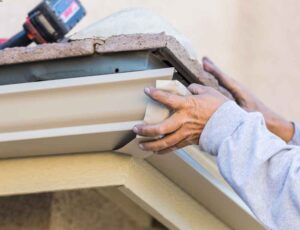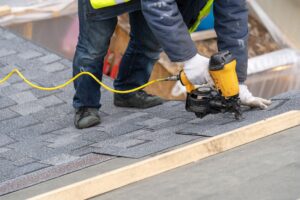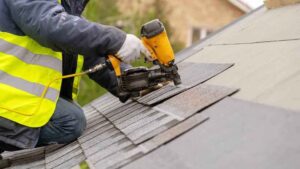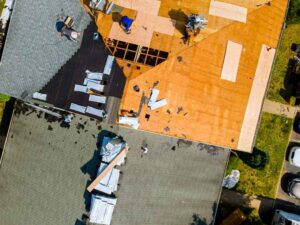The Right Metal Roof Starts with the Right Gauge
Here in Louisville, we’ve seen it all—tornado watches, freezing rain, hail the size of golf balls, and humidity that sticks around long after Derby Day. And if there’s one thing we know as roofing pros and homeowners ourselves, it’s this:
Your roof has to be built for more than just looks. It has to hold up when it matters.
That’s why more local homeowners are asking,
- What gauge is metal roofing, really?
- What gauge metal roof is best for a climate like Louisville?
- What is the best gauge for metal roofing when you want longevity and value?
At Cornett Roofing Systems, we’ve been helping homeowners make smart, lasting decisions about metal roofing for over 30 years. Gauge matters—especially when you’re investing in your forever home.
In this guide, you’ll learn:
- What “gauge” means in the context of metal roofing
- How different gauges impact performance and cost
- What gauge is best for homes in Louisville
- What to know before choosing a metal roof
- How Cornett Roofing Systems helps you make the right decision
Ready to make a smart, long-term investment in your roof? Cornett Roofing Systems can help with a free inspection and expert guidance.
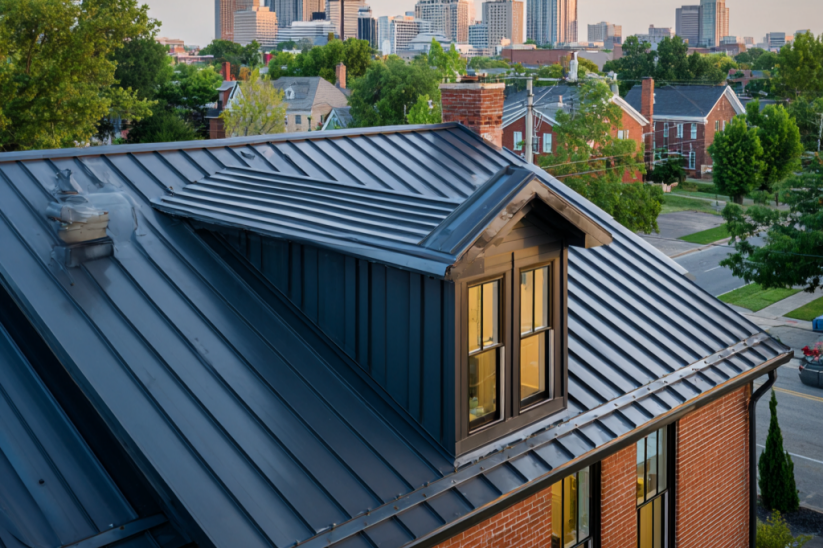
Understanding Gauge: What It Means for Your Metal Roof in Louisville
What Gauge Is Metal Roofing?
Gauge refers to the thickness of the metal panel used in a roofing system. The numbers are counterintuitive: the lower the number, the thicker the metal.
Here’s a quick comparison of common roofing gauges:
| Gauge | Thickness (inches) | Common Use |
| 22-gauge | 0.031″ | Commercial buildings, high-impact zones |
| 24-gauge | 0.026″ | Standard for residential metal roofing |
| 26-gauge | 0.018″ | Light-duty residential or agricultural structures |
| 29-gauge | 0.014″ | Sheds, barns — not recommended for homes |
So, what gauge metal roof is best for Louisville homes? 24-gauge is typically ideal. It’s thick enough to handle our storms, durable under snow loads, and resistant to denting from hail.
Why Roof Gauge Matters More in Louisville’s Climate
In Louisville, your roof isn’t just dealing with the occasional storm. It’s taking on:
- Sudden temperature swings from winter to spring
- Heavy snow and ice accumulation
- Tornado-strength wind gusts
- UV exposure and high humidity in the summer
That’s why choosing the right gauge is more than just a technical detail—it’s your roof’s first line of defense.
Solution Prep: What to Know Before Choosing a Roof Gauge
Before selecting the best gauge for your metal roof in Louisville, it’s important to consider a few practical points.
1. Understand the Cost Difference
Heavier gauges like 22 or 24 cost more upfront, but they provide better strength and longer service life. Thinner panels may save money now, but they’re more likely to require repairs or early replacement.
2. Check Local Code Requirements
Some parts of the Louisville Metro area have wind or snow load codes that impact gauge selection. We handle code compliance and permitting as part of every project.
3. Consider Roof Structure and Slope
Longer spans, flatter pitches, and exposed areas benefit from stronger, thicker panels that resist sagging or “oil canning.”
4. Think About Long-Term Maintenance
A thicker gauge reduces your chances of dents, leaks, or performance loss from expansion and contraction over time.
5. Choose a Trusted Installer
Even the best metal panel won’t protect your home if it’s installed incorrectly. We custom-manufacture our metal systems and install them with precision built for Louisville weather.
Metal Roofing Gauge Comparison: Which Is Right for Your Louisville Home?
Pros and Cons of Each Gauge
| Gauge | Pros | Cons | Best Used For |
| 22-gauge | Maximum strength, dent resistance | Heavier, more expensive | High-impact areas or large buildings |
| 24-gauge | Balance of strength, weight, and cost | Slightly higher cost than 26/29 | Most Louisville homes |
| 26-gauge | Budget-friendly, lightweight | Less durable, more prone to dents | Detached garages, light residential use |
| 29-gauge | Lowest cost | Not suitable for severe weather | Sheds, barns, not recommended for homes |
What Is the Best Gauge for Metal Roofing in Louisville?
The best gauge for metal roofing in Louisville is typically 24-gauge steel. It provides a solid balance of cost, strength, and durability—perfect for withstanding Midwest storms without compromising aesthetics.
Want to learn how gauge fits into the broader metal roofing conversation?
Don’t miss our full guide: The Premier Guide to Metal Roofing
Deep Dive: Why Cornett Roofing Uses the Right Gauge for Every Roof
Our Metal Roofs Are Built in Kentucky, for Kentucky
We don’t outsource our materials. At Cornett Roofing Systems, we manufacture our own metal tile and slate systems—right here in the region. That means:
- We choose the right gauge based on your home’s structure and environment
- We control the quality from raw material to final panel
- We custom-fit your roof with precision
Better Warranties and Better Results
Because we control the product, we confidently offer:
- 50-year manufacturer warranties
- 10-year workmanship warranties
And with over 30 years in business, we’ll be here to honor them.
More Than Just Strength—Energy Efficiency Matters Too
Thicker panels hold high-performance reflective coatings better, which helps:
- Lower attic temperatures
- Reduce your HVAC workload
- Cut cooling costs by up to 25%
That’s one more reason to invest in the best gauge for metal roofing, not just the cheapest.
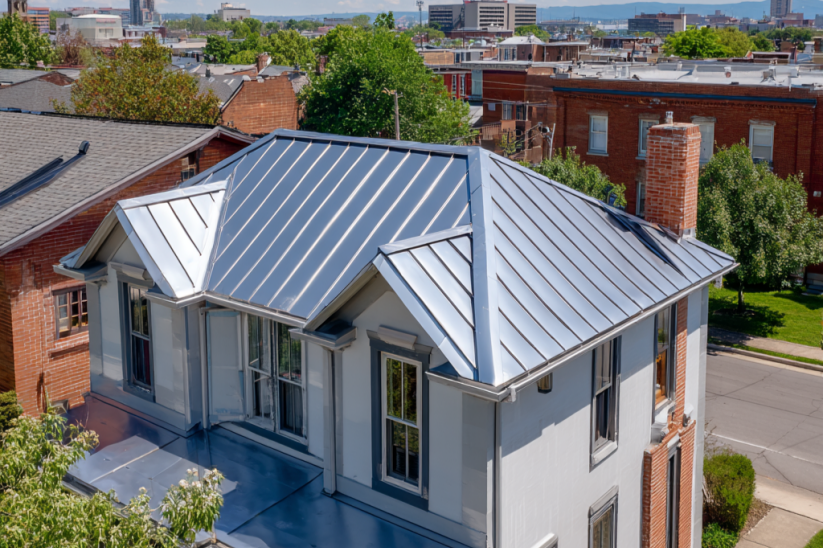
Louisville Metal Roofing FAQs: Gauge, Durability, and More
What gauge is metal roofing for residential homes in Louisville?
The most common gauge of metal roofing for homes in Louisville is 24-gauge steel. It provides the durability needed to withstand local weather without the extra weight or cost of 22-gauge.
What gauge metal roof is best for hail and storm resistance?
The best metal roof gauge for hail-prone areas like Louisville is 22- or 24-gauge. Thicker panels resist denting and won’t deform under impact like thinner options.
What is the best gauge for metal roofing if I want a long-lasting roof?
If longevity is your goal, 24-gauge metal roofing is the best option. It lasts decades longer than thinner panels and better resists corrosion and weather damage.
Is 29-gauge metal roofing okay for a home in Louisville?
29-gauge metal roofing is not recommended for homes in Louisville. It’s too thin to handle high winds, hail, or snow load and may reduce the life of your roof significantly.
Will a heavier gauge roof add value to my home?
Yes, a heavier gauge like 24-gauge adds value by improving roof strength, appearance, and warranty coverage—important for resale.
Can I mix gauges on different parts of my roof?
While technically possible, it’s uncommon. Most homes use one consistent gauge for performance and appearance. We’ll recommend the best option based on your home’s needs.
Conclusion: Choose the Right Gauge for a Roof That Lasts in Louisville
When it comes to protecting your home from Louisville’s unpredictable weather, the right roofing system makes all the difference—and so does the right gauge.
So, what gauge metal roofing should you opt for in Louisville?
In most cases, 24-gauge is the smart choice. It balances cost, strength, energy performance, and long-term durability—all while standing up to the challenges of our local climate.
At Cornett Roofing Systems, we don’t just install roofs—we manufacture them, customize them, and install them with your home and your region in mind.
Ready to get it right the first time? Schedule your free drone inspection today and let’s find the right metal roof—and the right gauge—for your Louisville home.

